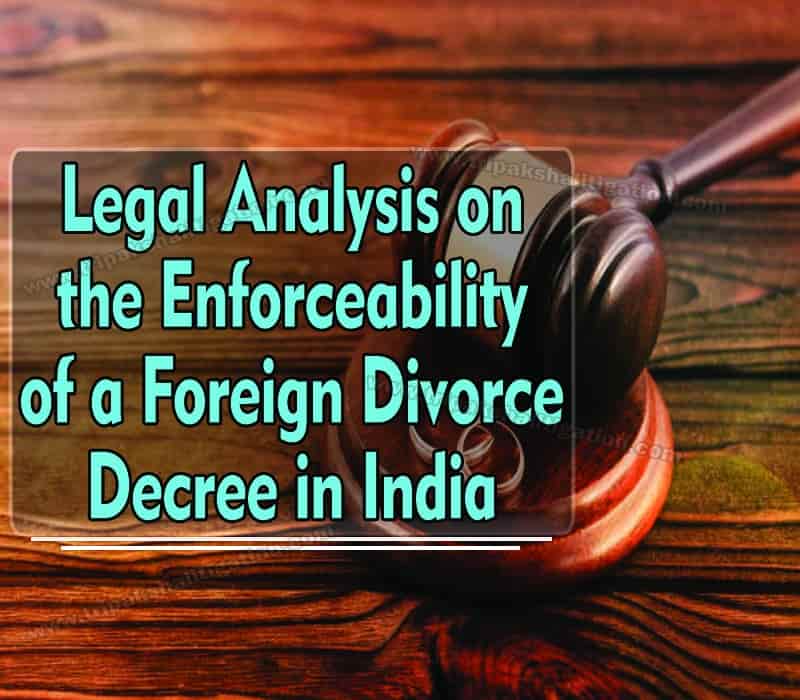Legal analysis on the enforceability of a foreign divorce decree in India
Enforceability of a foreign divorce decree
The Courts in India were confronted with issues wherein the Hindu couples got married in India according to Hindu Law, but settled in a foreign land, develop matrimonial disputes and approach a foreign court. The Indian courts have to determine whether the decrees in matrimonial disputes passed by the foreign court between the Hindu couples settled abroad, had any efficacy in India[i].
In the case of Satyav.Teja Singh[ii]– The respondent had instituted a foreign court proceeding wherein the applicant has never lived. A false representation was made by the respondent that he was a bona fide resident of that State. It was concluded that the respondent had played a fraud on the foreign court by concealing the fact and hence, the foreign court had no territorial jurisdiction. The Apex Court of India declared the decree of the Foreign Court invalid.
Judicial Comity
Comity of Courts or Judicial Comity is a principle of law that entails that Courts of a particular jurisdiction will recognize and give effect to the judgments of a court of a different jurisdiction, out of deference[i]. Section 13 of the Civil Procedure Code (CPC) provides the circumstances under which a foreign judgment holds validity:
- When it is pronounced by a court of competent jurisdiction;
- When the judgment is passed on the merits of the case;
- When the judgment is not based on an incorrect view of international law or recognizes the law of India in cases in which such law is applicable;
- The proceedings are not in opposition of natural justice;
- It is not being obtained by way of fraud;
- It has not sustained on a claim founded on a breach of any law in force in India[ii].
Section 14 of the Code of Civil Procedure, 1908 (CPC) recognizes the concept of judicial comity and provides that a foreign judgement shall be conclusive as to any matter adjudicated upon and on the production of any document purporting to be a certified copy of a foreign judgement, it shall be presumed that such judgement was pronounced by a court of competent jurisdiction.
Judgment given on the merits of the case
The expression “a decision on the merits” involves the application of the judicial mind of the Court regarding the truth or falsity of the case presented by the plaintiff. A decision made after due consideration of the matter taking evidence into account shall be a decision on the merits even though passed ex parte.
The Apex Court in the case of International Woollen Millsv. Standard Wool (UK) Ltd.[v], observed that the evidence was led by the plaintiff/ applicant in the foreign court, the opposite party was served however, not appearing in such a case the decision of the Court would be considered “on merits”.
Two Categories of Cases
We shall discuss two broad categories that shall be carved out based on whether the opposite party in the foreign court appeared and participated in the proceedings or not[vi].
Did Not Attend nor Actively Participated
The opposite party always has an option to not attend or not actively participate in the foreign court proceedings. This may be implied as the non-applicant did not submit to the jurisdiction of the foreign court. It doesn’t mean that the opposite party is not required to be served in the foreign court proceedings. It must be noted that non-service of summons would lead to denial of opportunity to be heard.
In cases where the non-applicant doesn’t submit to the jurisdiction implies that the party doesn’t get an opportunity to present his case. The challenge to the foreign court decree may be entertained in such cases by the courts in India. The notice of the foreign court proceedings must be served to the non-applicant. The proceedings held before the foreign court would hold no value in law. The courts in India are likely to declare the proceedings void of the foreign courts.
In K.N. Guruswami v. Muhammad Khan Sahib[vii]– It was held by the Madras High Court that just because a person entered into a contract in a foreign country, it does not mean that he has submitted to the jurisdiction of the Courts of that country. Hence, the decree of a foreign court was not extra-territorially valid and it cannot be considered as a competent court.
Did attend and actively participated
If the opposite party attends the foreign court proceedings then he/she cannot complain that the party was not being heard. The opposite party shall be deemed to have appeared voluntarily before the court. However, a separate plea can be raised by the respondent before the jurisdiction of the foreign court for granting alimony or monthly maintenance.
In Mrs. Anoop Beniwal v. Dr. Jagbir Singh Beniwal[viii]– The High Court of Delhi dealt with an issue wherein a divorce decree was granted by a UK court. The parties actively participated in the court proceedings. The wife later contested the divorce decree in a court in India. It was observed by the Apex Court of India that both the parties were given the opportunity of being heard before the UK court and the case was not against natural justice. Further, the element of fraud was not present and the case was decided on merit. It was observed by the court that the woman had submitted to the authority of the UK court and hence, the court refused to entertain the matter afresh.
Foreign Decree of Divorce Held Invalid: Consequences
The applicant cannot sit by getting a favorable decree from a foreign court; consequences may appear thereafter or maybe a few years later. The opposite party may apply for its cancellation in the courts of India[ix].
Consequences of invalidity of the foreign decree:
In the case of Y. Narasimha Rao and Ors. v. Y. Venkata Lakshmi and Anr.[x]– The parties were married as per Hindu customary law. A divorce petition was filed by the husband in a Circuit Court in the USA. A reply was filed by the wife protesting the same. The Circuit Court passed a divorce decree in absence of the wife. Later the husband got married to another woman. A criminal complaint was filed against him. In the instant matter, the court faced the question of whether the first marriage was dissolved in the light of the decree passed by the USA court. The Supreme Court answered this issue negatively and refused to recognize the divorce decree granted by the USA court.
In this case, the court cleared the position of Indian law wherein the court observed that ‘The jurisdiction assumed by the foreign court as well as the ground on which the relief is granted must be by the matrimonial law under which the parties are married.’
Executability of Foreign Court Decree
Section 44A read with Section 13 of the CPC deals with the execution of the decree. This provision applies to the execution of foreign decrees in general. The provision has little application to specific laws such as the Hindu Marriage Act, 1955 or the issue of custody of the child, etc. The specific laws/ statutes have an overriding effect on the said provision. Sub-section (3) to Section 44A clarifies that this is subject to the decree falling in any of the exceptions contained in Section 13 CPC[xi].
The Supreme Court held that a foreign judgment not arising from the decree of a superior court of a reciprocating territory cannot be executed in India. The court clarified that a fresh suit will have to be filed in India based on the foreign judgment. A “superior court” is a one that has both civil and criminal jurisdiction, and also has the jurisdiction to entertain appeals[xii].
Conclusion
In India, the law on enforcement of foreign judgments is provisioned under Section 13 and Section 44A of the CPC. The scope of enforceability of foreign judgments are interpreted u/s 13, has been thoroughly interpreted and defined by the Courts of India. A foreign divorce decree holder is required to have the said decree enforced in India within the given limitation period i.e. of three years from the date of obtaining the said decree. Otherwise the same shall be treated as a nullity and a decree on the same issue will have to be obtained from the Indian Courts.
[i] https://www.mondaq.com/india/court-procedure/931334/foreign-decree–enforceability-and-its-amplitude-over-a-period-of-time
[iii] Black Law Dictionary
[iv] https://www.livelaw.in/law-firms/articles/foreign-judgments-on-matrimonial-disputes-and-their-enforceability-in-india-164166#_ftnref3
[vi] https://www.scconline.com/blog/post/2019/02/25/decree-of-divorce-granted-by-a-foreign-court-and-its-maintainability-in-india-a-critical-analysis/#_ftn2
[vii] (1932) 63 MLJ 761 (India)
[viii] AIR 1990 Del 305
[ix] https://timesofindia.indiatimes.com/city/delhi/ex-parte-divorce-decree-by-foreign-court-invalid-hc/articleshow/19717428.cms
[x] 1991 SCR (2) 821
[xi] https://www.lexology.com/library/detail.aspx?g=0e5b9a45-99ca-410c-8ade-c5dd0d26856f#:~:text=The%20foreign%20decree%20is%20required,Code%20of%20Civil%20Procedure%2C%201908
[xii] https://www.legalserviceindia.com/legal/article-3689-enforcement-of-foreign-judgements-in-india.html
You may contact me for consultation or advice by visiting Contact Us and Call us









This article provides a comprehensive overview of the topic at hand ,making it easy for readers to understand and engage with the content.
The writing style is engaging and informative, with a good balance of factual information and personal insights.
The author has done a great job of highlighting the benefits of the subject matter, which could inspire readers to explore this topic further and perhaps even try it out for themselves.